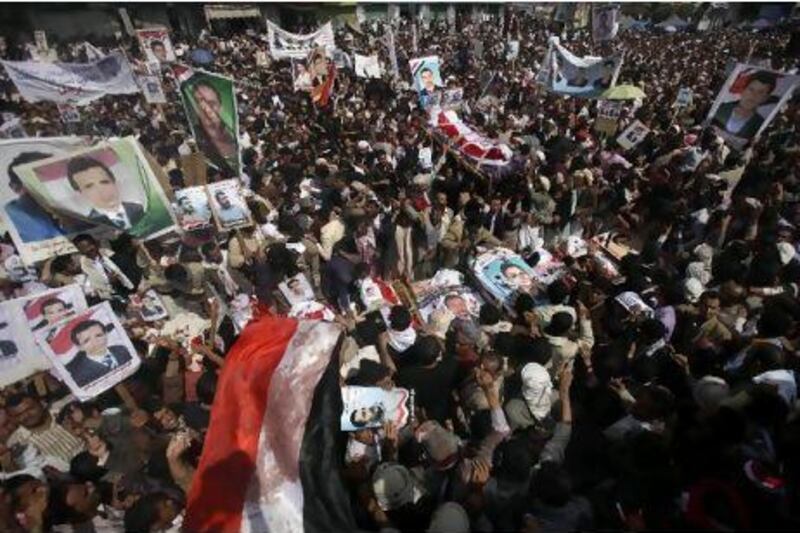SANA'A // Yemen's President Ali Abdullah Saleh fired his entire cabinet yesterday in an apparent move to cling to power amid mass demonstrations, government defections and the loss of vital support from powerful tribal leaders.
Mr Saleh's dismissal of his ministers, including the prime minister Ali Mujawar, was announced late yesterday in a brief statement released on government websites and state media.
No immediate explanation was given, but speculation is rife that the sacking was a pre-emptive move to thwart the planned resignations of a large segment of his inner circle. The abrupt move comes as Mr Saleh is increasingly under fire for his iron-fisted assault on peaceful pro-democracy protests on Friday that left more than 42 demonstrators dead and nearly 200 wounded, according to the health ministry.
The opposition movement has hailed the dissolution of the cabinet's as a sign of the government's impending collapse and an end to Mr Saleh's 33-year grip on power.
"This is an indication that the revolution has won and this dismissal of the government is a sign of collapse of the regime and its allies. It also demonstrates fears about the defections of other ministers after three ministers have already quit," Mohammed al Sabri, an opposition leader, said in reference to the recent resignations of Yemen's ministers of tourism, human rights and endowment in protest at last week's government crackdown. There has been a slate of other resignations, among them the chief of state-run media and the ambassadors to the UN and Lebanon.
"Now, we are just waiting for the announcement of the departure of Saleh and his whole regime," Mr al Sabri said.
The cabinet will remain as a caretaker government with no official powers until a new government is formed, state TV reported without explaining the process or time frame for selecting a new government.
The government assault on purportedly peaceful protests, including rooftop sniper attacks and police spraying crowds with live bullets, had enraged powerful tribal leaders in this nation dominated by blood ties and clan allegiances.
Sheikh Sadek al Ahmar, leader of the Hashid confederation, Yemen's most influential tribal bloc that includes Mr Saleh's clan, released a statement on Saturday calling for the president to peacefully relinquish power.
The statement, which was endorsed by other tribal chiefs and religious leaders, demanded that Mr Saleh prevent further bloodshed by "responding to the demands of the people".
Tribal and religious leaders also called for the abolition of Yemen's intelligence apparatus, the National Security Agency, and the elite army regiment led by Mr Saleh's son known as the Republican Guards.
The violence also drew condemnation from the UN and the United States, which backs Mr Saleh's government with hundreds of millions of dollars in military aid to battle a potent al Qa'eda offshoot based in Yemen's mountainous hinterlands. Before Mr Saleh's snap dismissal of his cabinet, protesters had already showed their displeasure in the streets.
A massive funeral procession for those killed in Friday'a attacked wove through Sana'a yesterday, carrying portraits and Yemeni flag-draped coffins of those killed through the streets. Most of the victims were in their 20s, opposition leaders said, and one was a 13-year-old. As they marched, the tens of thousands-strong crowd chanted, "Oh, martyrs, rest in peace. We will not let the killer go free," referring to Mr Saleh.
The coffins were carried from a private hospital to the main protest site at al-Tagheer Square and were later taken to a nearby cemetery.
At the al-Tagheer Square ceremony, opposition leader Walid al Omari told the assembled crowd through a microphone: "This must be the last drop of blood to be shed by Saleh. We wanted to prepare for a bigger funeral but some of the families wanted to bury their loved ones. However, we promise these martyrs a much bigger funeral at the presidential palace one day".
In recent weeks, Mr Saleh had launched a raft of concession meant to appease the protesters. After Friday's violence he described the victims as "martyrs for democracy," and blamed the opposition movement for "incitement and chaos" that had led to the killings. Since Friday's attack, Mr Saleh has appeared reluctant to employ more force disbanding police and special forces around Sana'a University, which has been the centre of the deadly crackdown, and replacing them with a largely unarmed force.
But Mr Saleh's reforms and softer security measures have not dissuaded the mounting protest movement. According to opposition leaders, determination among the ranks of the protesters is only growing.
"I feel very sad to lose my son who used to support our family," said Abdulaleem al Qubati, 53, as he sat behind his son's coffin yesterday at the protest site.
"But I feel happy that he gave his life for our revolution."
* With additional reporting from the Associated Press





